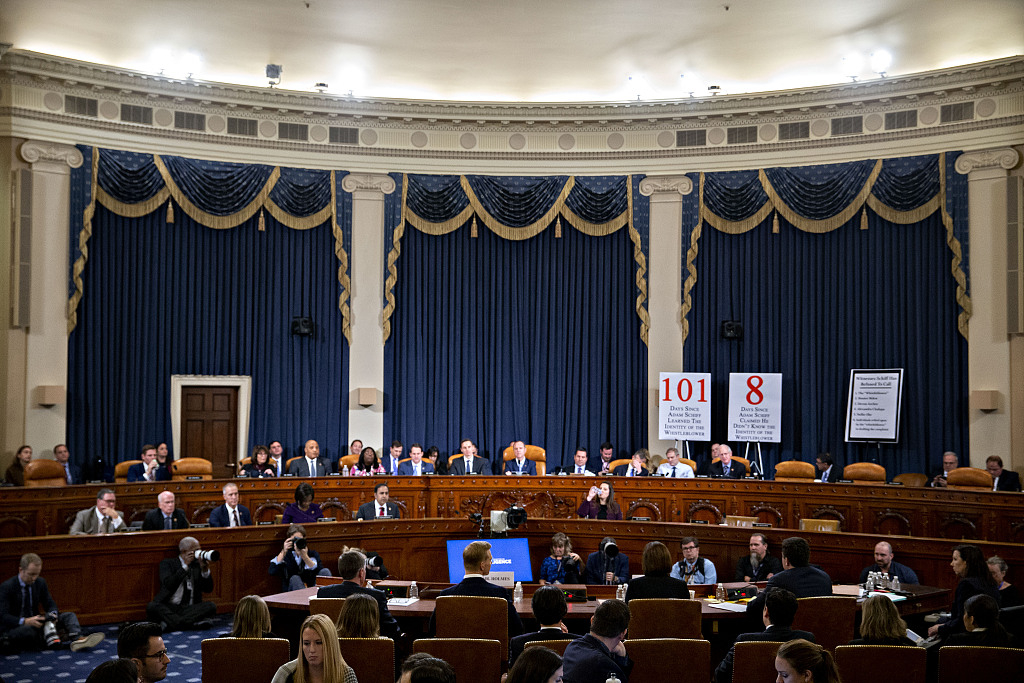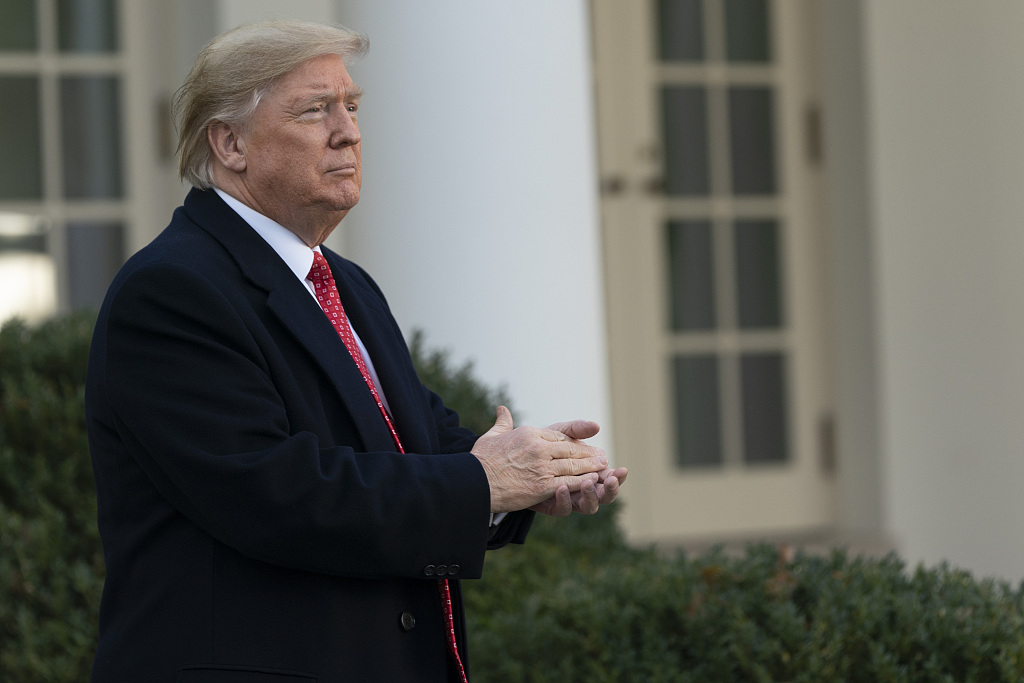The House Judiciary Committee is set to take over the impeachment probe of President Donald Trump next week, scheduling a December 4 hearing on the question of "high crimes and misdemeanors" set out in the Constitution.
The hearing, announced Tuesday, will feature legal experts who will examine the constitutional grounds for impeachment.
House Judiciary Committee Chairman Jerrold Nadler said that it will "explore the framework put in place to respond to serious allegations of impeachable misconduct."
The Judiciary hearing will come as the House Intelligence Committee is expected to submit a report compiling evidence of its probe into Trump's dealings with Ukraine.
The intelligence panel held two weeks of impeachment hearings this month examining Trump's requests for Ukraine to investigate Democrats as the U.S. withheld military aid to the country.

The U.S. Capitol dome is seen from the entrance to the House Intelligence Committee's Sensitive Compartmented Information Facility (SCIF) November 16, 2019. /VCG Photo
The U.S. Capitol dome is seen from the entrance to the House Intelligence Committee's Sensitive Compartmented Information Facility (SCIF) November 16, 2019. /VCG Photo
Trump and his lawyers are invited to attend the hearing and make a request to question witnesses, according to Democratic rules approved by the House last month. The committee released a letter from Nadler to the president, saying that he hopes Trump will participate, "consistent with the rules of decorum and with the solemn nature of the work before us."
It's unlikely that the president himself will attend the hearing, as Trump is scheduled to be overseas on December 4 to participate in a summit with NATO allies outside London. The Judiciary panel gave the White House until December 1 to decide whether Trump or his lawyers would attend.
Meanwhile, an attorney for the White House's budget office resigned in part because of concerns over the hold on U.S. military aid to Ukraine, an official for the office said according to a transcript of his deposition released on Tuesday.
Mark Sandy, a career official at the Office of Management and Budget, which ordered the hold on security assistance to Ukraine, told congressional investigators during the House of Representatives' impeachment inquiry that a person in the office's legal division resigned in part over issues with the hold.

Mark Sandy, an official of the Office of Management and Budget, arrives for a closed-door deposition as part of the House of Representatives impeachment inquiry into U.S. President Trump on Capitol Hill in Washington, U.S., November 16, 2019. /VCG Photo
Mark Sandy, an official of the Office of Management and Budget, arrives for a closed-door deposition as part of the House of Representatives impeachment inquiry into U.S. President Trump on Capitol Hill in Washington, U.S., November 16, 2019. /VCG Photo
Trump briefed on whistle blower complaint before releasing Ukraine aid
Trump had already briefed about the whistle-blower's complaint against his deal with the Ukraine president, the New York Times reported on late Tuesday citing sources from two people familiar with the matter.
The people told the New York Times that lawyers from the White House counsel's office brief Trump in late August on the complaint and explained that they wanted to make sure whether they were legally obligated to give it to congress.
Net support for impeachment grows steadily
Public support for impeaching Trump has tracked steadily higher over the past few weeks, according to a Reuters/Ipsos opinion poll released on Tuesday.
The Reuters/Ipsos poll was conducted online, in English, throughout the United States. It gathered responses from 1,118 adults, including 528 Democrats, 394 Republicans and 111 independents. It has a credibility interval, a measure of precision, of three percentage points.
The latest poll, conducted on Monday and Tuesday, found that 47 percent of adults in the United States felt Trump "should be impeached," while 40 percent said he should not.

The House Intelligence Committee holds the impeachment inquiry in Washington, U.S., November 21, 2019. /VCG Photo
The House Intelligence Committee holds the impeachment inquiry in Washington, U.S., November 21, 2019. /VCG Photo
The result, combined with Reuters/Ipsos polling over the past several weeks, showed that the number of Americans who want to impeach the president increasingly outnumbers those who do not.
Just before the hearings started on November 13, the Reuters/Ipsos poll found that "net support" for impeachment, which is the difference between the number who support impeachment and the number who oppose, was three percentage points.
That increased to four points after the first week of hearings, and then to five points as the second week of hearings started. The latest poll shows that net support for impeachment is now at seven points.

U.S. President Donald Trump applauds after presenting the National Thanksgiving Turkey at the White House, Washington, U.S., November 26, 2019. /VCG Photo
U.S. President Donald Trump applauds after presenting the National Thanksgiving Turkey at the White House, Washington, U.S., November 26, 2019. /VCG Photo
Public opinion about impeachment remains split along party lines, with about eight in 10 Democrats supportive of impeaching Trump, and eight in 10 Republicans opposed.
The Reuters/Ipsos poll showed that seven in 10 Republicans believed the House inquiry had not been conducted fairly, and most Republicans opposed impeachment for anything short of outright lawbreaking by the president.
Four in 10 Republicans agreed that a president who uses his powers for financial gain should face an impeachment inquiry, while three in 10 said it would be justified for a president who obstructs justice or harms U.S. interests abroad.
Only two in 10 said an inquiry would be justified for a president who uses his powers for unfair political advantage over an opponent, as Trump is accused of doing.
Six House committees investigating U.S. President Trump on impeachable offenses will send their strongest cases to the House Judiciary Committee.
If a majority of House members vote to impeach Trump, the articles of impeachment will move to the Senate, which then will hold a trial.
If a two-thirds majority in the senate voted to convict Trump, he would become the first U.S. president to be removed from office through impeachment.
However this outcome is unlikely to happen as the Senate is currently controlled by Republicans.
(With input from Reuters, AFP)